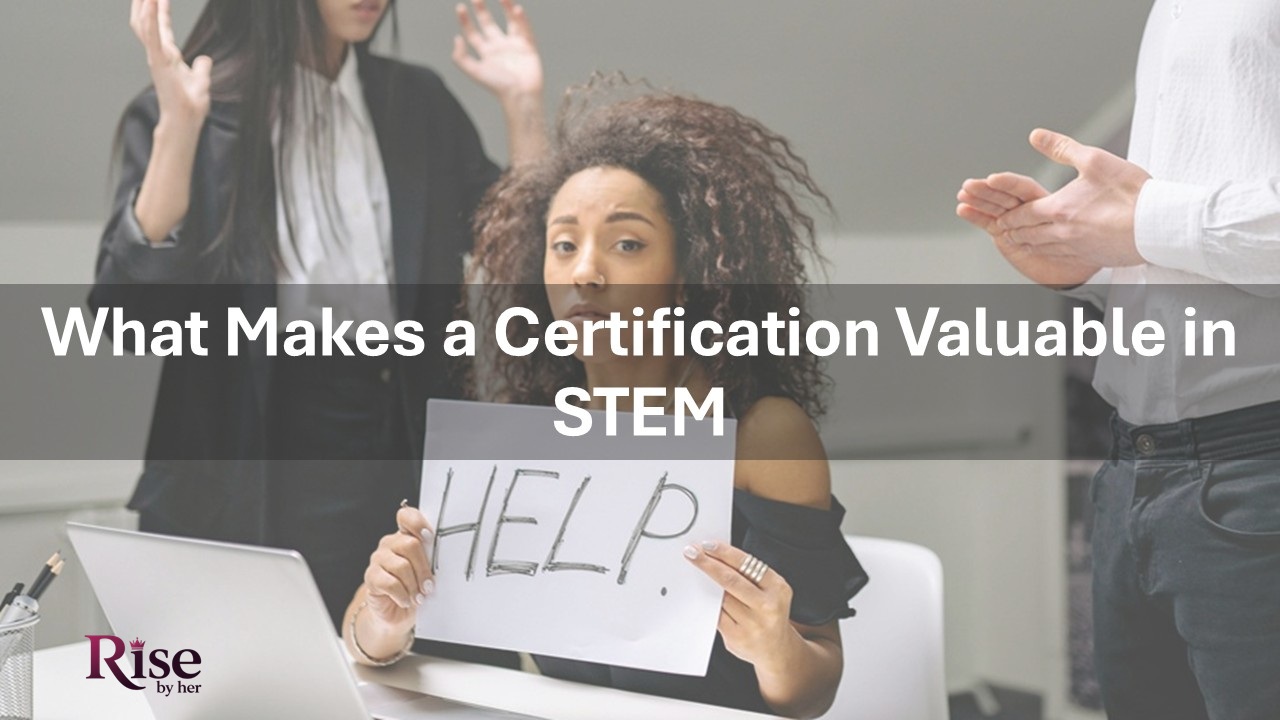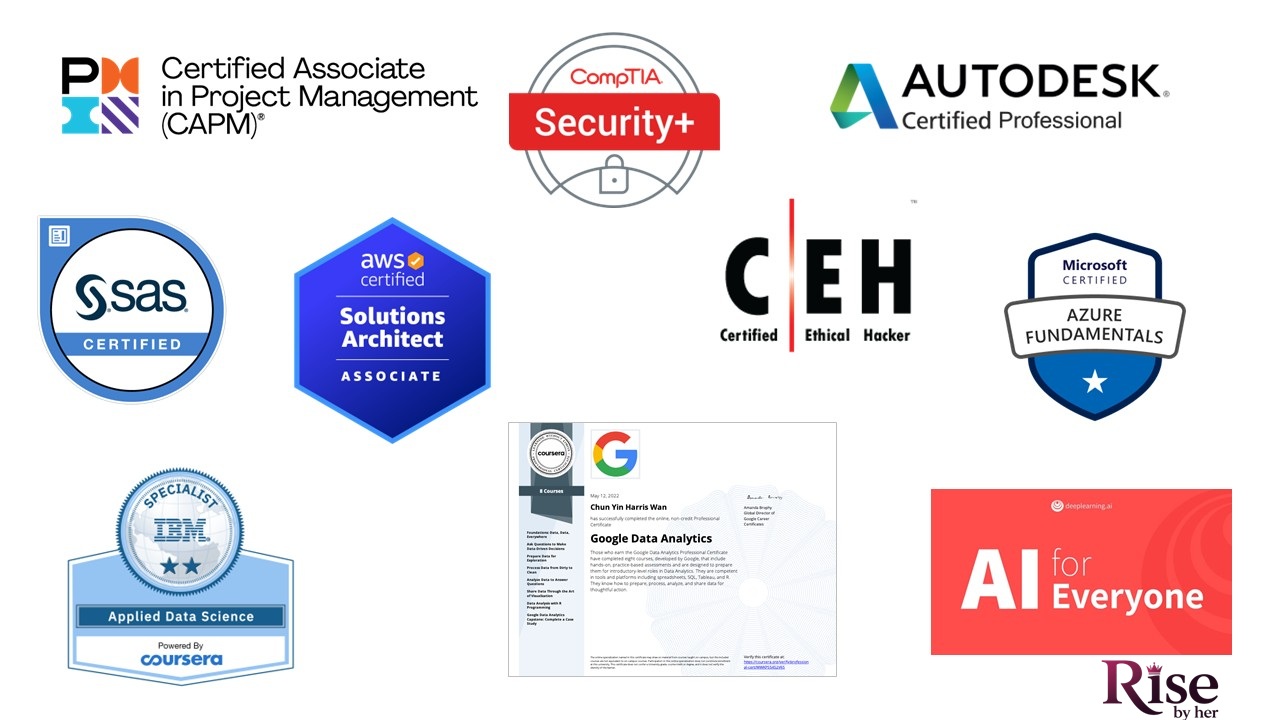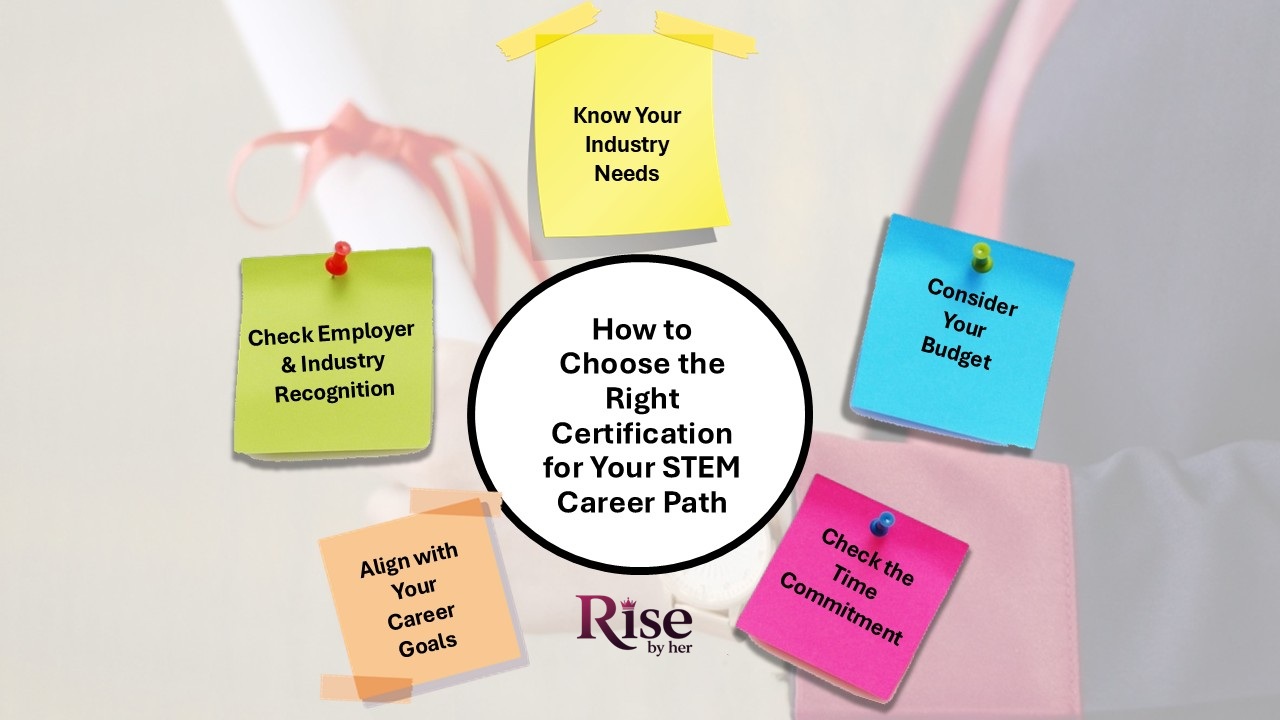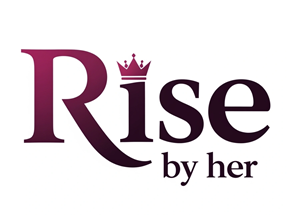In 2026, women are continuing to make powerful strides in science, technology, engineering, and mathematics (STEM) fields. From leading breakthroughs in AI and biotech to founding startups in sustainable tech, women are reshaping the future of innovation. But despite this progress, many still face challenges in breaking into and climbing the ranks of these competitive industries.
That’s where certifications come in.
Whether you’re starting out or looking to pivot, earning a respected certification can boost your credibility, sharpen your skills, and open doors to higher-paying roles. In today’s fast-changing job market, continuous learning is no longer optional, it’s essential. And for women in male-dominated tech spaces, it’s also a strategic way to stand out and confidently build authority.
If you’ve ever wondered why certifications matter for women in STEM or how to grow your tech career as a woman, this guide is for you. We’ll walk you through the most in-demand certifications in 2026, how to choose the right one, and where to get started, no matter what your current level of experience.
Ready to level up your STEM career with credentials that matter? Let’s dive in.
Why Certifications Matter More Than Ever in 2026
In today’s fast-paced world of innovation, certifications have become more than just a line on your resume, they’re a ticket to career mobility, recognition, and real-world opportunities. As industries like artificial intelligence, cloud computing, and biotech continue to evolve, employers are placing greater value on verified skills and specialized knowledge.
For women in STEM, certifications are especially powerful. While the gender gap in science and technology is slowly closing, many women still face challenges like underrepresentation, unconscious bias, and limited access to mentorship. Earning a recognized credential can help bridge that gap by validating expertise and reinforcing confidence in your abilities.
Here’s why certifications are career-boosting tools for women in STEM in 2026:
- They show proven skills: Certifications are trusted, standardized proof that you know your stuff. No second-guessing.
- They help bypass bias: When your qualifications are backed by a credible authority, it’s easier to gain respect in traditionally male-dominated industries.
- They boost salary potential: Professionals with in-demand certifications often command higher pay, especially in tech and engineering roles.
- They unlock new roles: Whether it’s transitioning to cybersecurity or advancing in AI, the right certification can open new doors quickly.
Whether you’re eyeing a leadership role or a shift into a niche field, tech certifications that open doors for women are more accessible than ever. Online programs, micro-credentials, and industry-backed certificates make it easier to fit learning into your life and accelerate your STEM journey.
In short? Certifications aren’t just a “nice-to-have”, they’re your career’s best power move.
What Makes a Certification Valuable in STEM
Not all certifications are created equal. In 2026, with thousands of courses and programs out there, knowing what makes a certification truly valuable in STEM is key, especially for women looking to break barriers and accelerate their careers. Whether you’re starting fresh or leveling up, look for certifications that check these essential boxes:

Industry Recognition
A valuable certification should be backed by trusted institutions or well-known industry leaders. Think: Google, Microsoft, AWS, CompTIA, PMI, or university-affiliated programs on platforms like edX and Coursera. These names carry weight with recruiters and hiring managers.
Job Market Demand
Use tools like the U.S. Bureau of Labor Statistics (BLS) and the LinkedIn Learning Report to find out which certifications are in demand. Fields like cloud computing, data science, AI, cybersecurity, and biotech continue to grow rapidly—and so does the need for certified talent.
Salary Boost Potential
Certifications like Certified Information Systems Security Professional (CISSP) or AWS Certified Solutions Architect are known to significantly increase earning potential. Search average salary outcomes before investing time and money.
Beginner-Friendly vs. Advanced Options
Valuable certifications are tailored to your experience level. If you’re just starting out, look for beginner-friendly programs like Google Career Certificates. For seasoned professionals, advanced credentials like Certified Ethical Hacker (CEH) or PMP® may be better suited.
Flexibility and Accessibility
The best programs are designed for busy women balancing work, study, and life. Choose top online certifications for women in science and technology that offer self-paced options, mobile access, and downloadable resources.
By focusing on certifications that align with job demand, salary growth, and accessibility, you’ll ensure your efforts pay off, both professionally and personally.
Top 10 STEM Certifications Every Woman Should Consider (2026 List)
Ready to level up your STEM career? Whether you’re just starting out or ready to specialize, here are the top STEM certifications for women in 2026, covering data, cloud, cybersecurity, design, AI, and more.

Google Data Analytics Certificate
- Who it’s for: Beginner
- What you’ll learn: Data cleaning, analysis, visualization, and tools like Excel, SQL, and R
- Industry value: Highly recognized entry point for data science and business analytics roles
- Estimated cost: ~$39/month (Coursera subscription)
- Platform: Coursera
- Why it’s great: Flexible, no degree required, beginner-friendly
AWS Certified Solutions Architect – Associate
- Who it’s for: Intermediate
- What you’ll learn: Designing scalable systems on Amazon Web Services
- Industry value: In-demand cloud certification with high salary potential
- Estimated cost: ~$150 for exam
- Platform: AWS Training + Udemy prep courses
- Why it’s great: Cloud skills are in high demand across industries
Microsoft Azure Fundamentals (AZ-900)
- Who it’s for: Beginner to intermediate
- What you’ll learn: Core Azure services, cloud concepts, pricing, and compliance
- Industry value: Recognized by employers in IT, finance, and healthcare
- Estimated cost: ~$99 exam fee
- Platform: Microsoft Learn, Coursera
- Why it’s great: Perfect intro to cloud for non-tech and tech pros alike
IBM Data Science Professional Certificate
- Who it’s for: Beginner to intermediate
- What you’ll learn: Python, SQL, data analysis, machine learning basics
- Industry value: Respected in the data science space
- Estimated cost: ~$39/month (Coursera)
- Platform: Coursera
- Why it’s great: Hands-on projects + flexible learning
CompTIA Security+
- Who it’s for: Intermediate
- What you’ll learn: Cybersecurity principles, network security, risk management
- Industry value: Entry-level certification for cybersecurity jobs
- Estimated cost: ~$392 exam fee
- Platform: CompTIA, LinkedIn Learning, Cybrary
- Why it’s great: Globally recognized in security job roles
Certified Ethical Hacker (CEH)
- Who it’s for: Advanced
- What you’ll learn: Penetration testing, hacking tools, ethical hacking techniques
- Industry value: High-level cybersecurity certification
- Estimated cost: ~$950+
- Platform: EC-Council, Udemy
- Why it’s great: Boosts credibility for women in cybersecurity
Autodesk Certified Professional
- Who it’s for: Intermediate to advanced (designers, engineers, architects)
- What you’ll learn: 2D/3D modeling, AutoCAD, Revit, Inventor
- Industry value: Recognized in architecture, engineering, and construction
- Estimated cost: ~$150 per exam
- Platform: Autodesk, LinkedIn Learning
- Why it’s great: Must-have for women in engineering and industrial design
PMI Certified Associate in Project Management (CAPM)
- Who it’s for: Beginner to intermediate
- What you’ll learn: Project planning, budgeting, timelines, agile methods
- Industry value: Trusted in tech, engineering, biotech, and corporate roles
- Estimated cost: ~$225 for PMI members
- Platform: PMI, Coursera, LinkedIn Learning
- Why it’s great: Entry to project management in STEM industries
SAS Programming Certification
- Who it’s for: Intermediate (especially in healthcare, research, or biotech)
- What you’ll learn: SAS coding, analytics, data management
- Industry value: Used heavily in pharmaceutical, government, and health research
- Estimated cost: ~$180–$250
- Platform: SAS Training
- Why it’s great: Great for data-heavy careers in science and health tech
Coursera – AI For Everyone (by Andrew Ng)
- Who it’s for: Beginner (non-coders and coders alike)
- What you’ll learn: What AI is, how it’s used, and its impact on work and society
- Industry value: Great foundational knowledge for all STEM fields
- Estimated cost: Free or ~$49 for certificate
- Platform: Coursera
- Why it’s great: Understand AI without needing deep technical skills
These top certifications for women in STEM in 2026 aren’t just resume boosters—they’re game changers. Choose based on your passion, goals, and industry trends. And most importantly, keep learning and leveling up.
How to Choose the Right Certification for Your STEM Career Path
With so many options out there, picking the right certification can feel overwhelming. The key is to match your career goals, industry trends, and personal strengths to the right program.

Know Your Industry Needs
Different STEM fields value different certifications. Here’s a quick breakdown to guide your search:
- Biotech / Healthcare: Look for certifications in SAS, data analysis, or regulatory compliance (e.g., SAS Programming, Clinical Data Management).
- Cloud Computing: Target cloud-specific credentials like AWS Certified Solutions Architect or Microsoft Azure Fundamentals.
- Cybersecurity: Go for Security+, CEH, or CISSP depending on your level and experience.
- AI / Data Science: Explore IBM Data Science, Google’s TensorFlow Developer Cert, or Coursera’s AI for Everyone for foundational knowledge.
- Engineering / Design: Certifications like Autodesk or Lean Six Sigma can boost technical and managerial credibility.
Consider Your Budget
Some certs are free or under $100 (like Coursera or edX), while others can cost over $500. Ask yourself:
- Is this certification essential for landing a job or promotion?
- Will it pay off in increased salary or job opportunities?
If you’re tight on funds, start with free platforms or opt for certifications that allow monthly subscriptions (like Google or IBM on Coursera).
Check the Time Commitment
Be realistic about your schedule. Some certifications can be completed in a weekend, while others take months.
- Short-term, high-impact certs: Google Data Analytics, Microsoft Azure Fundamentals.
- In-depth, career-track certs: AWS, CompTIA, or CAPM.
Align with Your Career Goals
Ask yourself:
- Do I want to break into a new field or advance in my current one?
- Am I looking for technical depth, leadership, or cross-functional skills?
Check Employer & Industry Recognition
Always verify if your target certification is:
- Recognized by top companies in your field
- Mentioned in job descriptions for roles you want
- Endorsed by industry bodies (like PMI, CompTIA, AWS, etc.)
Bonus: Ask mentors, join LinkedIn groups, or peek at current job listings on platforms like Glassdoor or Indeed for confirmation.
Where to Take These Certifications
Now that you know which certifications can elevate your STEM career, the next step is knowing where to actually take them. Thankfully, 2026 offers a range of accessible platforms that make learning flexible, affordable, and career-focused, perfect for women in STEM looking to upskill on their own terms.
Coursera remains one of the top options, with programs from tech giants like Google, IBM, and top universities. You can audit most courses for free and only pay if you want the certification, and financial aid is widely available. Google Career Certificates are also hosted on Coursera, offering beginner-friendly paths into IT support, UX design, and data analytics.

edX, launched by Harvard and MIT, provides more academic-oriented professional certificates and MicroMasters programs. It’s ideal if you’re looking for credentials recognized by top institutions, and financial aid is often available.
For a more self-paced and budget-friendly option, Udemy has thousands of courses in everything from ethical hacking to data science. While it doesn’t offer financial aid, most courses go on sale for under $20, making it a great entry point for women trying to break into new STEM fields.
LinkedIn Learning is also growing in popularity, especially for quick certifications you can showcase directly on your LinkedIn profile. A one-month free trial gives you access to thousands of courses in tech, project management, and data analysis.
Finally, platforms like Microsoft Learn, AWS Skill Builder, and Cisco Networking Academy offer free or low-cost training designed to prepare learners for industry exams in cloud computing, cybersecurity, and networking.
Conclusion: Start Your Certification Journey Today
If you’re a woman aiming to thrive in STEM, 2026 is the perfect time to take that next bold step. Certifications not only boost your skills but also help break barriers, build confidence, and open doors to new opportunities in science and tech. Whether you’re just starting out or leveling up, picking even one certification can spark real change in your career.
- So don’t wait, get certified in STEM as a woman and start building the future you deserve.
- Subscribe to our newsletter for the latest opportunities, scholarships, and certification tips.
- Share this post with another woman in tech or drop a comment below with the certification you’re most excited to pursue.
Your journey starts now. Let’s grow together.


